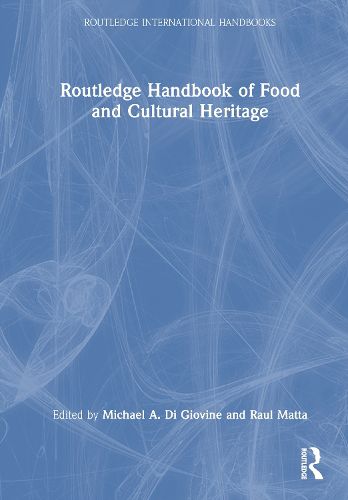Readings Newsletter
Become a Readings Member to make your shopping experience even easier.
Sign in or sign up for free!
You’re not far away from qualifying for FREE standard shipping within Australia
You’ve qualified for FREE standard shipping within Australia
The cart is loading…






The Routledge Handbook of Food and Cultural Heritage explores the many varied intersections of food and cultural heritage from a robust, transdisciplinary perspective.
Innovative in its approach, this cutting-edge Handbook thinks beyond traditional boundaries to present unique perspectives on the myriad ways in which food and cultural heritage are entangled in theory and practice. Both are growing industries; both are deeply rooted in families, cultures, and societies; both generate controversy and are deployed for political and economic activism. They also both have intellectual lives of their own, and are centers of interdisciplinary fields themselves-yet they also intersect in interesting and, until this book, under-theorized ways. After a comprehensive introduction that presents and challenges the state-of-the-art in the disciplines of critical food and critical heritage studies, the Handbook's chapters are divided into six themes common to both fields: Ontologies and epistemologies of food and cultural heritage; material culture; identity, placemaking and belonging; politics and regulation; tourism development and heritage management; and contemporary issues and emerging approaches. To give representation of voices not usually heard in the scholarly tradition, special interviews with food-and-heritage practitioners complement the comprehensive chapters, adding further depth to the volume through their own lived experiences.
With contributions from nearly 50 internationally recognized scholars, social scientists, dieticians, practitioners, and activists, this book is essential reading to scholars, students, researchers, industry professionals, and practitioners looking to understand the complex and compelling ways in which food, foodways, and cultural heritage overlap and impact each other, providing venues for collaborations.
$9.00 standard shipping within Australia
FREE standard shipping within Australia for orders over $100.00
Express & International shipping calculated at checkout
The Routledge Handbook of Food and Cultural Heritage explores the many varied intersections of food and cultural heritage from a robust, transdisciplinary perspective.
Innovative in its approach, this cutting-edge Handbook thinks beyond traditional boundaries to present unique perspectives on the myriad ways in which food and cultural heritage are entangled in theory and practice. Both are growing industries; both are deeply rooted in families, cultures, and societies; both generate controversy and are deployed for political and economic activism. They also both have intellectual lives of their own, and are centers of interdisciplinary fields themselves-yet they also intersect in interesting and, until this book, under-theorized ways. After a comprehensive introduction that presents and challenges the state-of-the-art in the disciplines of critical food and critical heritage studies, the Handbook's chapters are divided into six themes common to both fields: Ontologies and epistemologies of food and cultural heritage; material culture; identity, placemaking and belonging; politics and regulation; tourism development and heritage management; and contemporary issues and emerging approaches. To give representation of voices not usually heard in the scholarly tradition, special interviews with food-and-heritage practitioners complement the comprehensive chapters, adding further depth to the volume through their own lived experiences.
With contributions from nearly 50 internationally recognized scholars, social scientists, dieticians, practitioners, and activists, this book is essential reading to scholars, students, researchers, industry professionals, and practitioners looking to understand the complex and compelling ways in which food, foodways, and cultural heritage overlap and impact each other, providing venues for collaborations.